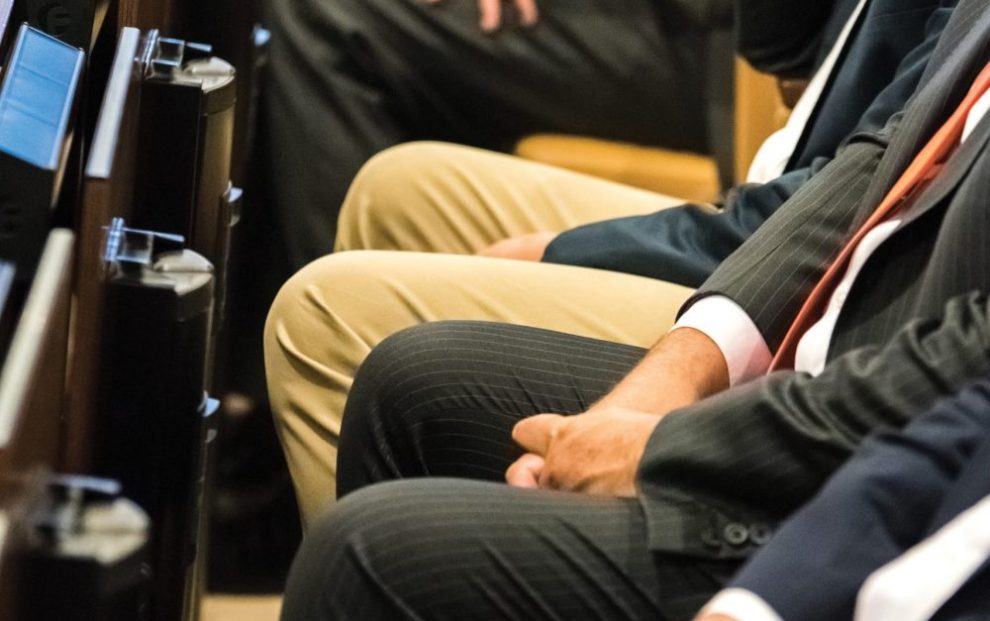When I first started dating my husband, I hated sitting next to him at Mass. His leg was constantly bouncing, shaking the pew and distracting me from what was happening in the liturgy. I would gently place my hand on his knee or ask him to stop, and he would—only to start the bouncing again a few moments later.
This wasn’t the only repetitive habit he demonstrated throughout the day. He also twirled pens in his hand while he talked, swayed side to side while watching baseball on TV, and paced the room after sitting too long. He said he’d formed these habits when he was a child trying to deal with his constant need for movement while adults scolded him repeatedly for not sitting quietly and paying better attention to what he was doing.
Despite my annoyance at the bouncing leg, I love my husband’s energy, sense of adventure, and delight in the things he loves. He is a fun, engaging, and caring partner who has inspired me to be courageous, take risks, and find joy in everyday life.
After we married and had our own children, we saw the same “motor” in three of the four. They were active, happy children, but they just couldn’t sit still in church, school, or at the dinner table. I still remember sitting at a library story time with my oldest, wondering why all the other toddlers could listen attentively while he kept wandering off. Our kids also struggled more than their peers with impulsivity, focus, and emotional regulation.
Because of these symptoms, school staff and our children’s doctor suggested we have them tested for attention-deficit/hyperactivity disorder (ADHD), a medical condition in which brain development affects the prefrontal cortex’s executive function (the part of the brain that handles things like planning, impulse control, problem-solving, and multitasking). ADHD tends to run in families and, if left untreated, can increase the likelihood of low school performance, depression, anxiety, addiction, and injury from accidents.
Despite these challenges, when our kids were ultimately diagnosed with ADHD, my husband and I were relieved. Now we knew we weren’t making bad parenting choices or struggling with problems no other family had. Our children are neurodivergent, which means they need different support from what neurotypical kids require.
Still, I often struggled to understand my family. When the kids had a hard time finishing their homework or my husband forgot important tasks, my patience ran thin. I spent hours organizing our calendars, household, and activities, hoping to compensate for the distraction, forgetfulness, and hyperactivity that were always part of our household. The effort I expended sometimes made me resentful; as I frequently complained to my therapist, I had to be the prefrontal cortex for everyone else. I often prayed that God would “fix” their symptoms or that my kids would “grow out” of their ADHD. Despite knowing their diagnosis was not a curable disorder, I saw it as a barrier to their becoming the people God made them to be.
I’m ashamed, in some ways, to write these sentences. I’m ashamed I saw my family as anything less than who God made them to be. I’m angry at myself for how long I subconsciously saw my family as broken, rather than the beautiful, complex, and engaging people they are.
“If there is one thing that having neurodivergent kids has taught me about parenting, it’s that I am a guide, not a dictator.”
So many positives come with ADHD, as well as challenges. My husband and children are amazing at thinking outside of the box, and they have a deep sense of justice and compassion for others. They are great at pattern recognition, reading social interactions, and bringing lightness and energy to a room. How could I possibly think that compassion, kindness, joy, and mental agility are anything less than gifts from God? My kids’ diagnosis is not a barrier. It is a floodlight that illuminates more fully how God made them to live in this world.
Confronting my own biases about neurodivergence has also made me more aware of the lies the world tells us about parenting and our children’s success. Our society says children’s lives should be scheduled and structured to ensure that discipline, learning, diet, and even free time are geared toward their future success. According to this perspective, childhood has a set path every child should walk, and it’s a parent’s job to direct that path.
At the same time, we live in a society that makes little space for children. In restaurants, on airplanes, at church, and in many other places, we expect children to behave like adults, and we blame their parents when they do not. Parents should be in control of their children; if they can’t, then kids should go somewhere they won’t disturb other adults. Even in schools, conformity is prized. We want children to sit quietly, not move, and do what they are asked without question. If they don’t, parents are ultimately blamed for not doing a better job training them at home.
But if there is one thing that having neurodivergent kids has taught me about parenting, it’s that I am a guide, not a dictator. God made my children in the divine image and likeness, with their own personalities, talents, and free will. The work of parenting is laboring with the Holy Spirit to love and nurture them as I watch the mystery of their lives unfold. I can teach them, listen to them, and be a model, but I will never be able to control them. I’ve spent one too many Masses wrangling ADHD toddlers to think any differently.
The world’s image of parenting success is an impossible ideal. Health cannot last forever, money can only provide so much stability, and my ultimate goal is not to raise good citizens. Instead, I want my children to grow into disciples of Jesus Christ who seek God’s kingdom above all else. If that means they disturb and disrupt the world so it becomes more compassionate and just, then I would choose that over their conformity every day of my life.
I am grateful for the ways the Lord has changed my thinking about neurodivergence. Even though we still have moments of frustration or misunderstanding, I am so much more patient and empathetic with my children than I used to be. My husband and my children are truly extraordinary people who bring so many gifts to the world. God has been so good to me. And I see it each week in the four sets of bouncing legs in my pew.
This article also appears in the July 2025 issue of U.S. Catholic (Vol. 90, No. 7, pages 43-44). Click here to subscribe to the magazine.
Image: iStock













Add comment